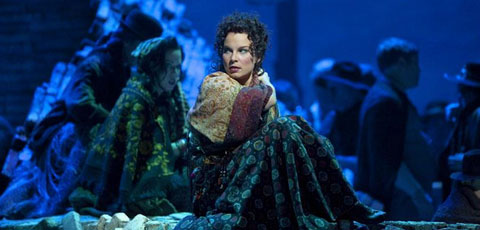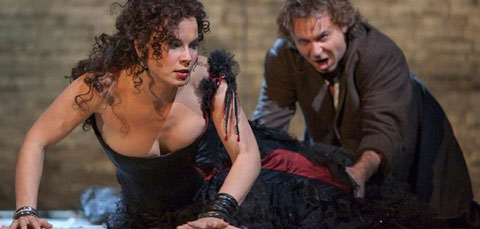Richard Eyre's mesmerising production of Bizet's steamy melodrama Carmen is wowing opera lovers at Cinema Nouveau as the third production in the new season of The Met: Live in HD.
The production features mezzo-soprano Anita Rachvelishvili singing her signature role of the ill-fated gypsy temptress. Aleksandrs Antonenko plays her desperate lover, the soldier Don José, and Ildar Abdrazakov is the swaggering bullfighter, Escamillo, who comes between them.
Pablo Heras-Casado conducts the irresistible score, which features one beloved and instantly recognisable melody after another. Bizet's masterpiece of the gypsy seductress who lives by her own rules, no matter what the cost, has had an impact far beyond the opera house. The opera's melodic sweep is as irresistible as the title character herself, a force of nature who has become a defining female cultural figure.
A soldier torn
This drama of a soldier torn between doing the right thing and the woman he cannot resist bursts with melody and seethes with all the erotic vitality of its unforgettable title character.
Georges Bizet (1838 to 1875) was a French composer whose talent was apparent from childhood. Carmen was his final work and its success was still uncertain at the time of his premature death (although the opera was not quite the total failure in its initial run that it has sometimes been called). Henri Meilhac (1831 to 1897) was a librettist and dramatist who would subsequently provide the libretto for Jules Massenet's popular Manon (1884).
His collaborator on the libretto for Carmen was Ludovic Halévy (1834 to 1908), the nephew of composer Jacques Fromental Halévy (composer of the opera La Juive and Bizet's father-in-law). Composer Ernest Guiraud (1837 to 1892), born in New Orleans, was a friend of Bizet's who wrote the recitatives between the set numbers when Carmen moved from the Opéra Comique (where dialogue was customary) to the opera houses of the world.
The libretto of Carmen is based on a novella by Prosper Mérimée (1803 to 1870), a French dramatist, historian, and archaeologist. According to one of his letters, the book was inspired by a true story that the Countess of Montijo told him during a visit to Spain. Published in 1845, it was Mérimée's most popular work.
A scandal at its premiere
Carmen was a scandal at its premiere and was roundly denounced in the press for its flagrant immorality. The power of the music and the drama, however, created an equally vocal faction in favour of the work. The composer Tchaikovsky and the philosopher Nietzsche both praised the opera, the latter identifying in the robustness of the score nothing less than a cure-all for the world's spiritual ills.
The opera takes place in and around Seville, a city that, by the time Carmen was written, had already served many operatic composers as an exotic setting conducive to erotic intrigues and turmoil (Rossini's Il Barbiere di Siviglia and Verdi's La Forza del Destino, among others). The home town of Don Juan, the city also inspired Mozart with Don Giovanni, and Beethoven used Seville as the setting for a study of marital fidelity in Fidelio. Carmen is particularly associated with this beguiling city of colourful processions, bullfights, and a vibrant gypsy community.
With 985 performances since its company premiere in 1884, Carmen is the third-most-staged opera in the Met's repertory, and the most-staged French-language opera by a significant margin. Though it is now given in the original French, in the early seasons of the Met it was sometimes performed in both Italian and German in keeping with standard performance practices of the time.
While both Anita Rachvelishvili and Elina Garanca have sung the title role in multiple Met seasons, they have many more performances to go before they challenge the record held by French diva Emma Calvé, who sang Carmen with the Met 138 times between 1893 and 1904. Her closest rival for the role remains American mezzo-soprano Risë Stevens, who sang Carmen 124 times between 1945 and her retirement in 1961.
Some of the most recognisable music
Carmen features some of the most recognisable music in the opera repertoire. Excerpts have been used in movies ranging from the Marx Brother's 1929 The Cocoanuts and the 1976 baseball classic The Bad News Bears to the 2009 Disney/Pixar film Up. In the award-winning 1943 Broadway musical Carmen Jones, Bizet's original score was combined with new English lyrics by Oscar Hammerstein and a setting updated to World War II. The show, which featured an African-American cast, was also adapted into a film in 1954.
The score of Carmen contains so many instantly recognisable melodies that it can be easy to overlook how well constructed it is.
The orchestra brings to life a wide palette of sound. The major solos are excellent combinations of arresting melody and dramatic purpose, most notably the baritone's famous Toréador Song, the tenor's wrenching Flower Song in Act II, and Micaëla's soaring Act III aria. Carmen and the lead tenor have three remarkable duets marking the stages of their fateful relationship: the seductive phase (Act I), conflict (Act II), and tragic explosion (Act IV).
Unlike in traditional operatic duets, however, they almost never sing at the same time, a device that emphasises their inherently disparate natures. Interestingly, while Carmen has several solos in the form of songs-that is, moments in which the character is actually supposed to be singing within the context of the drama-she has no actual aria.
It's a dramaturgical device that suggests she is seen first as a sort of celebrity, performing for others, and then as a projection of the fantasies of others.
The screening offers new backstage content and exclusive behind-the-scenes interviews with the stars, hosted live by star mezzo-soprano Joyce DiDonato during the opera's intermission.
There are interviews with the stars of Carmen, including mezzo-soprano Anita Rachvelishvili in the title role of the seductive gypsy, Aleksandrs Antonenko as the obsessed soldier Don José, soprano Anita Hartig in her highly anticipated HD debut as Micaëla, and Ildar Abdrazakov as the toreador Escamillo.
You can also experience a live view of the complicated scene change between Acts Two and Three and an interview with Met technical director John Sellars explaining how the tavern of Lillas Pastia transforms into the dramatic mountain hideaway.
Bonus
As a bonus there's an exclusive live peek into rehearsals for the Met's forthcoming production of Rossini's Il Barbiere di Siviglia, which will be the next Live in HD transmission on 20 December. Audiences will hear mezzo-soprano Isabel Leonard and baritone Christopher Maltman rehearse Rosina and Figaro's Act 1 duet, Dunque io son.
The death of Georges Bizet on 3 June, 1875, exactly three months after the famous opening night of Carmen at the Opéra Comique in Paris, is one of the cruellest ironies in the history of music. While it was certainly tragic that Puccini never lived to see Turandot and that Berlioz never lived to see Les Troyens, those composers were at the end of illustrious careers. Bizet was only 36 and had just revealed for the first time the true depth of his operatic genius. If Verdi, Wagner, or Strauss had died at that age, not many of their works would be heard in our opera houses today.
Carmen, will be screened at Cinema Nouveau theatres and select Ster-Kinekor cinemas, including Blue Route in Cape Town, Garden Route Mall in George and Bedford Centre in Joburg on 2 and 10 December at 11.30am, 9 December at 5pm, and 11 December at 5.30pm. (Approximate running time: 3hrs, 38mins - one intermission.)
Read more about live opera, theatre and art exhibitions on the big screen at www.writingstudio.co.za













































